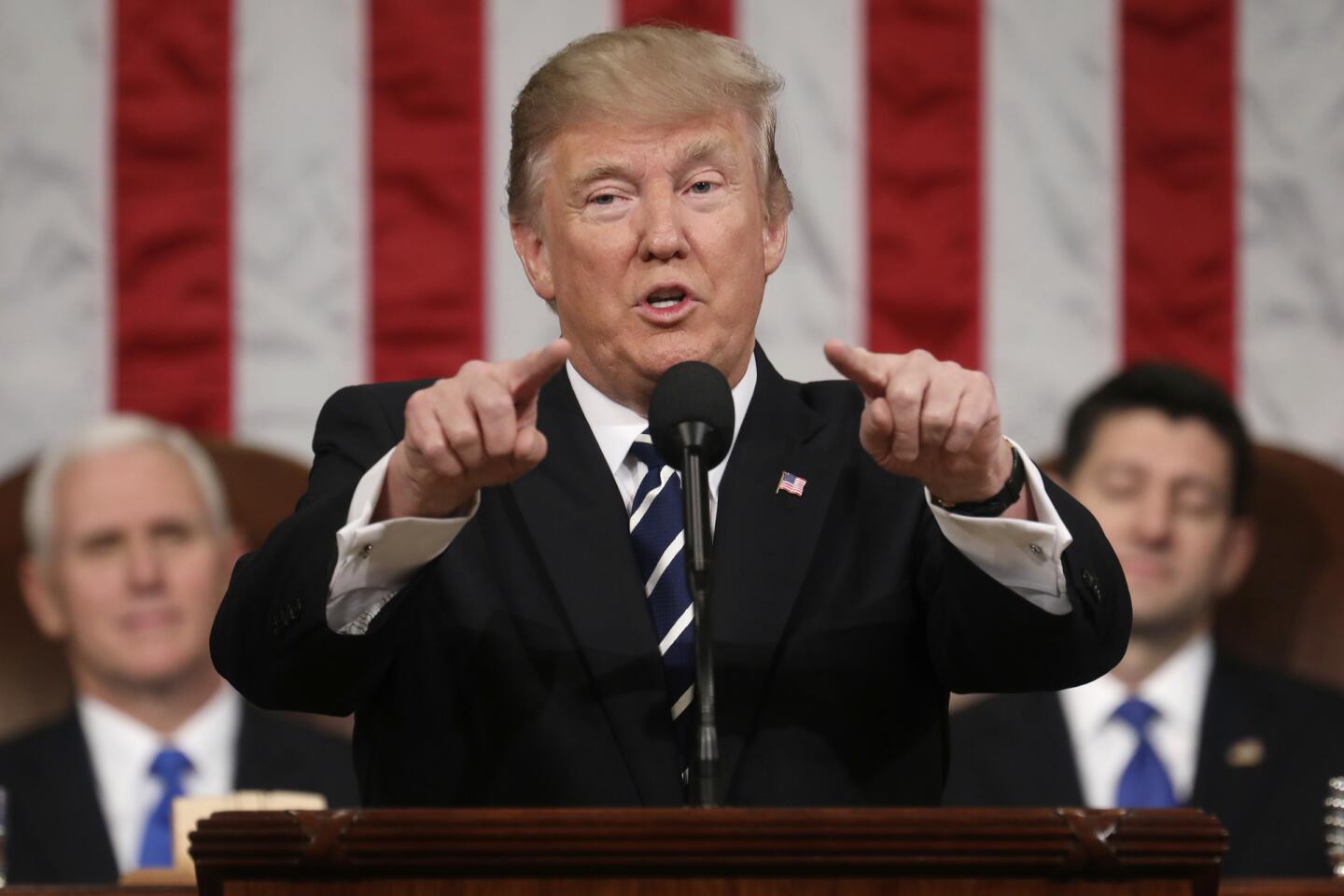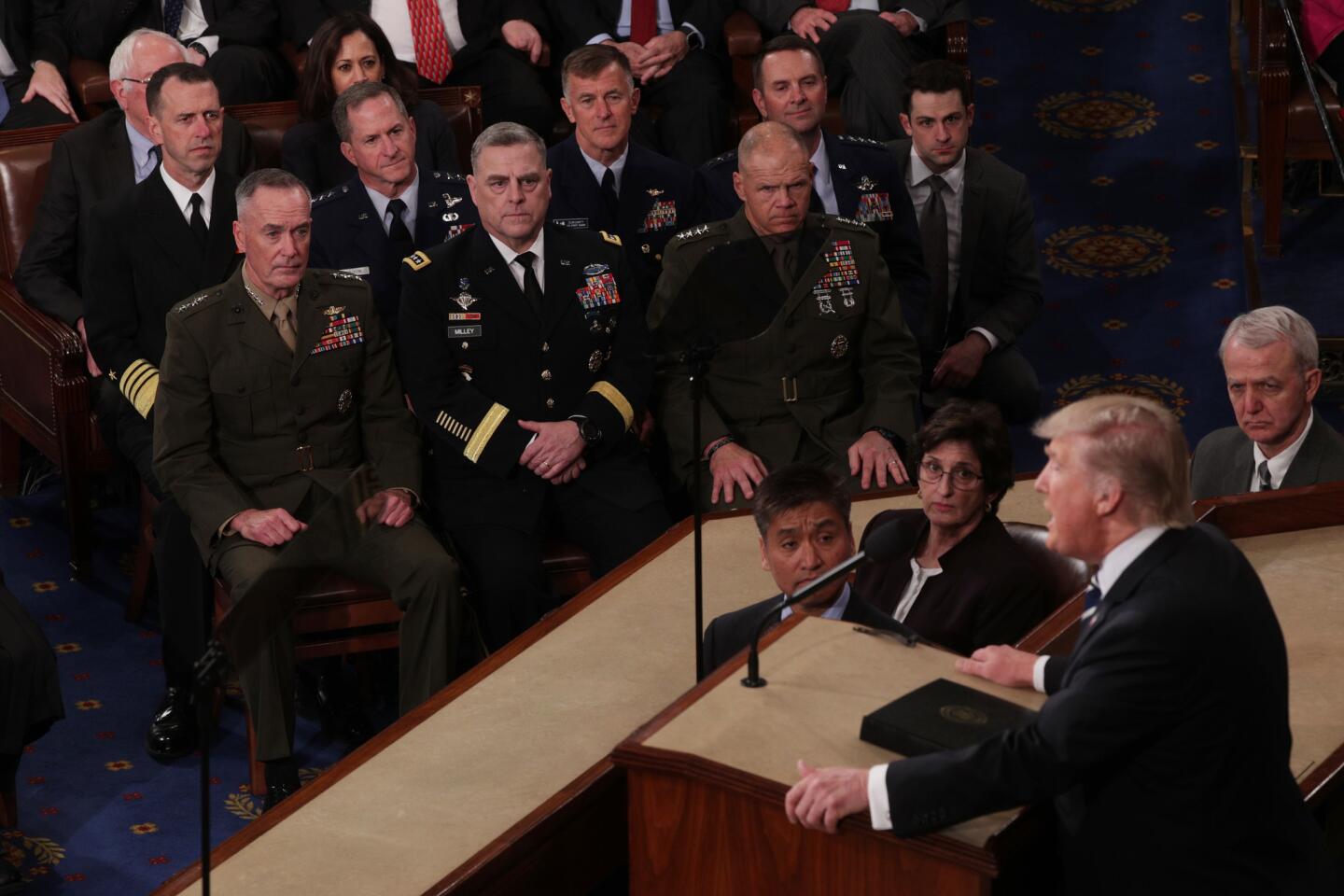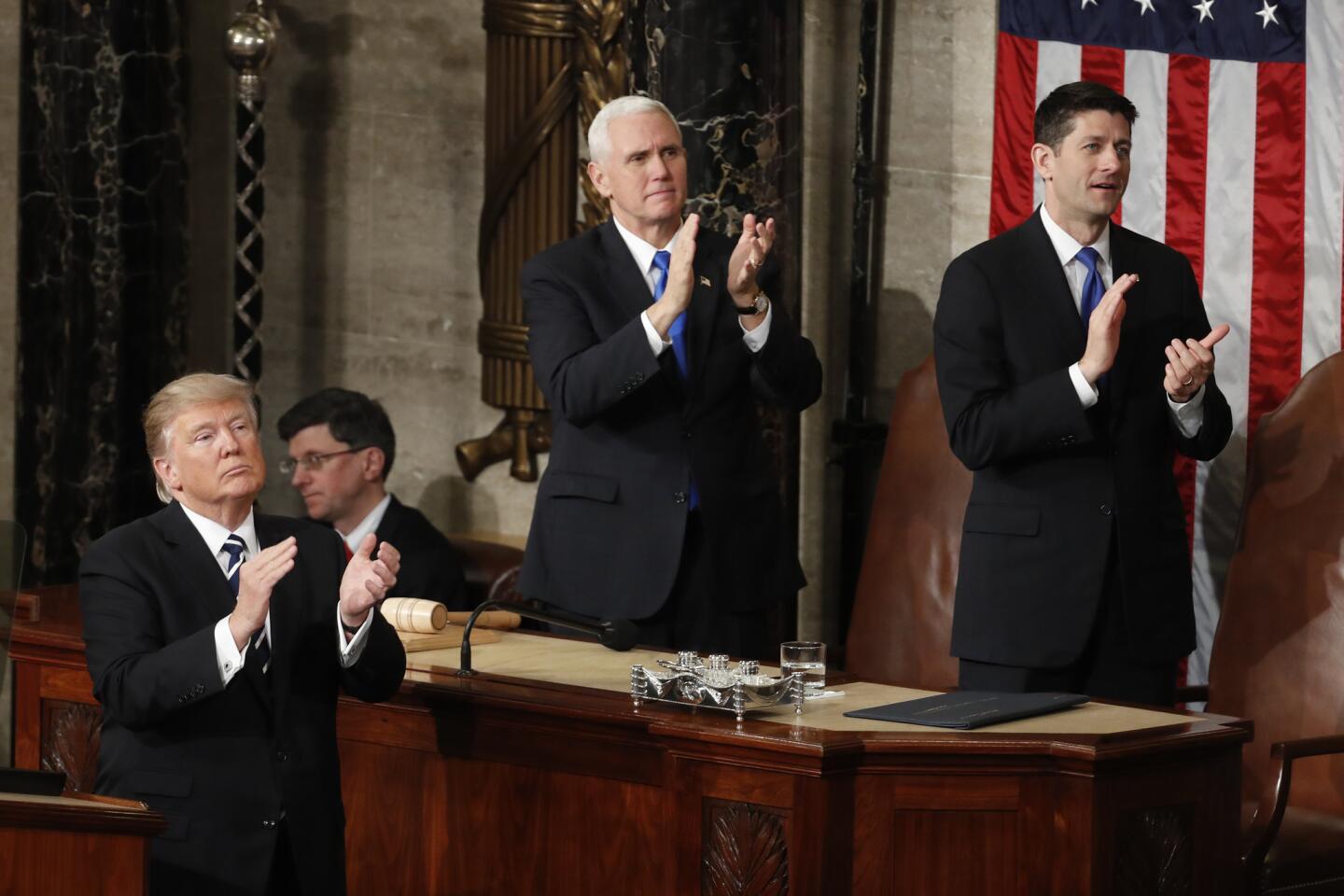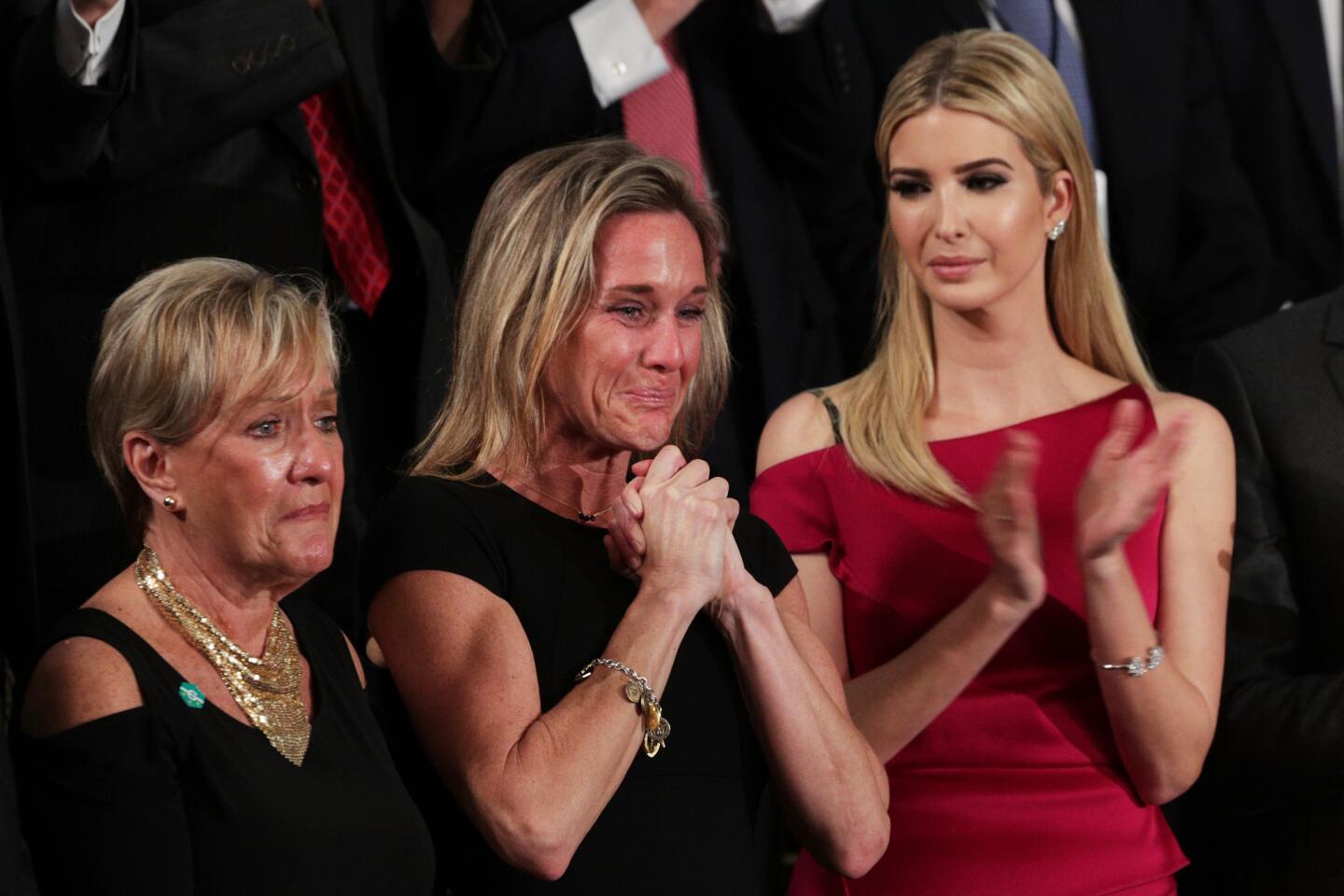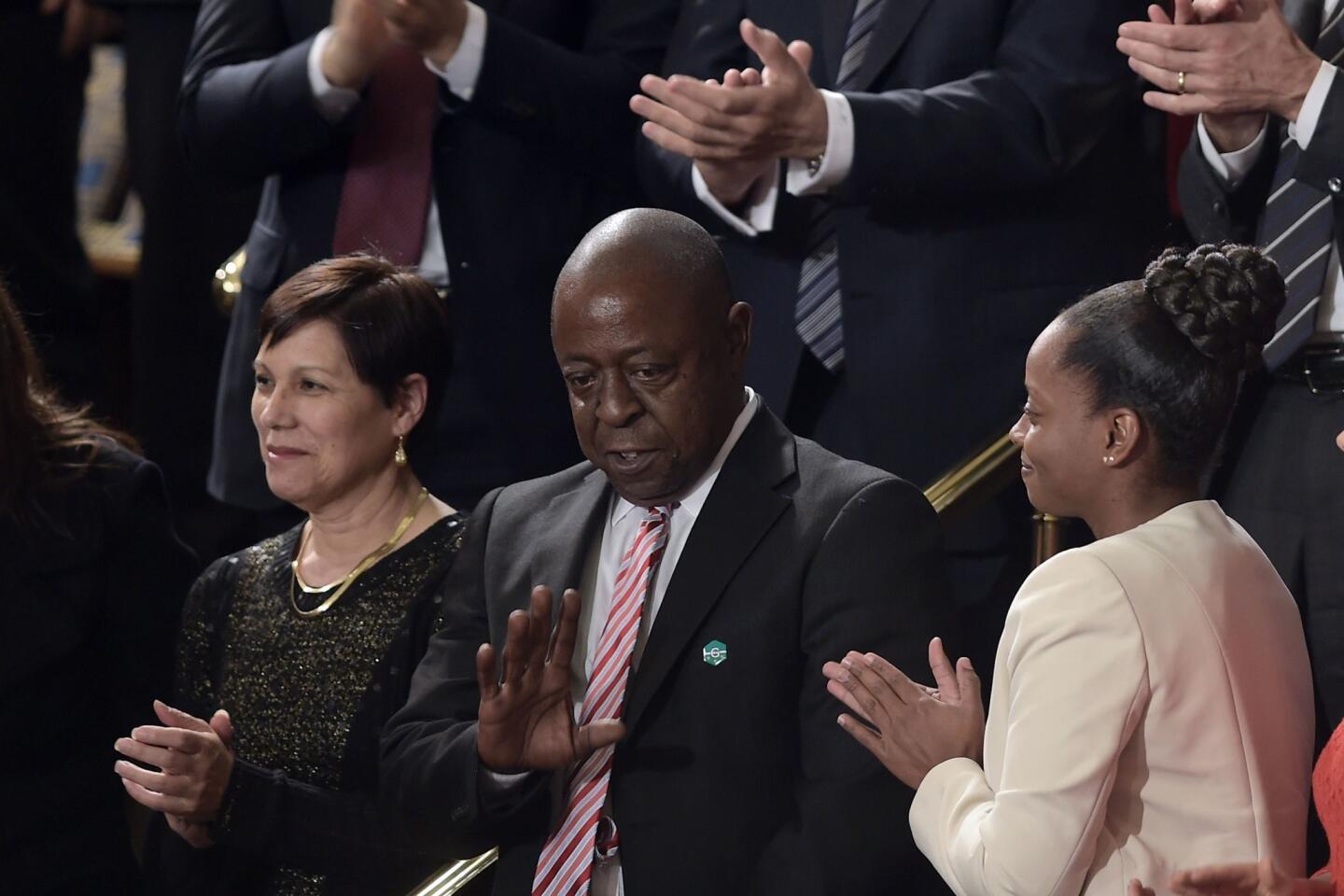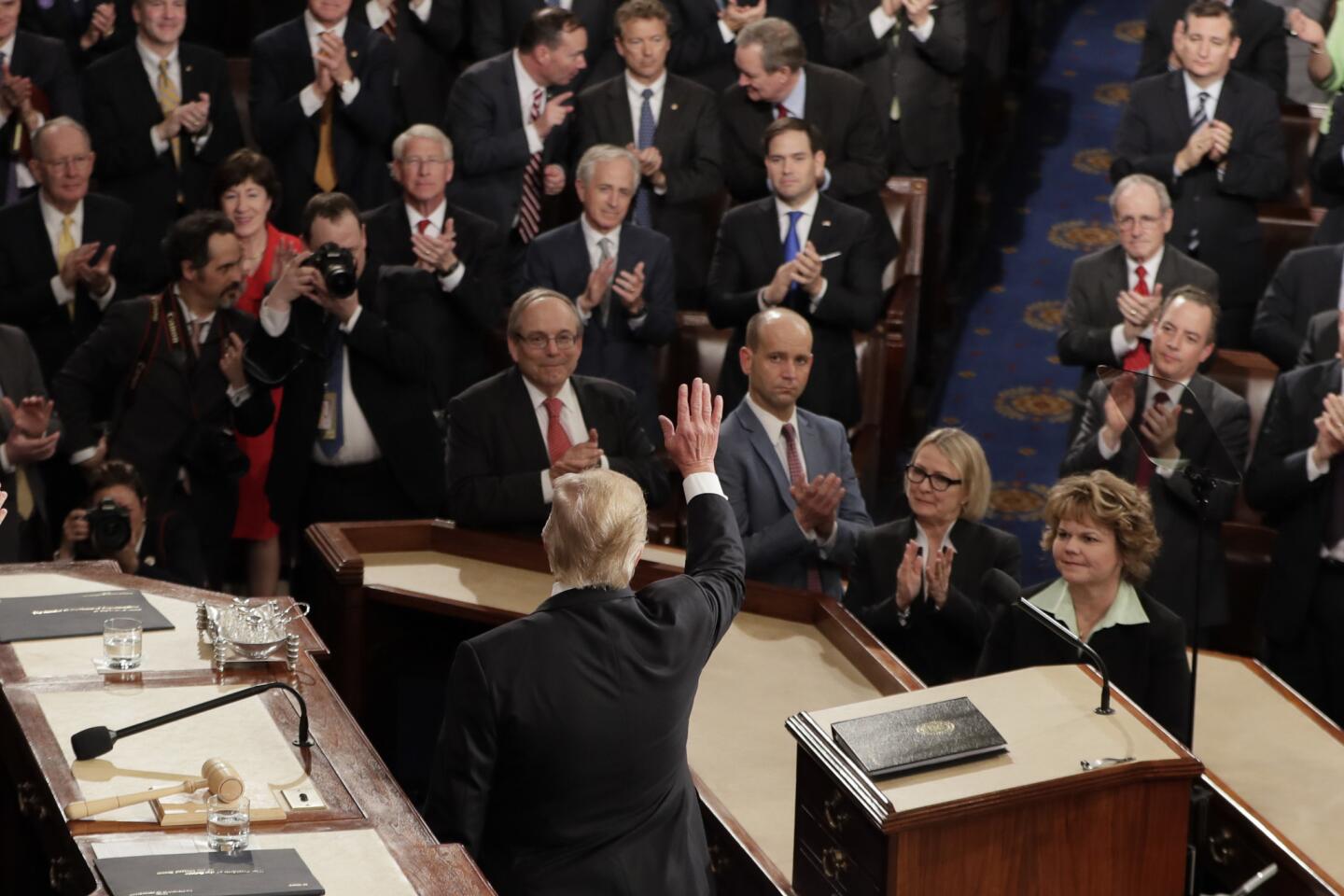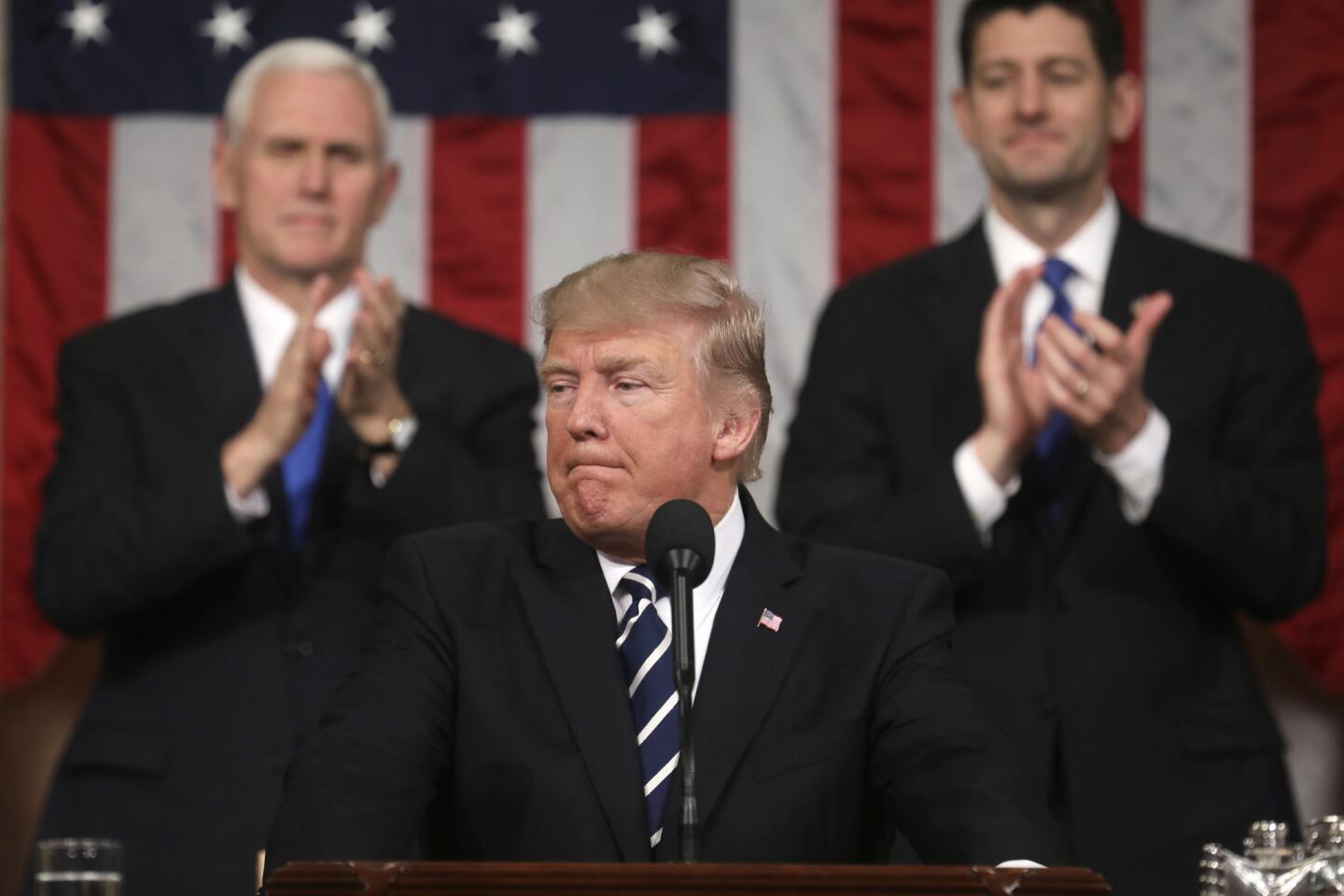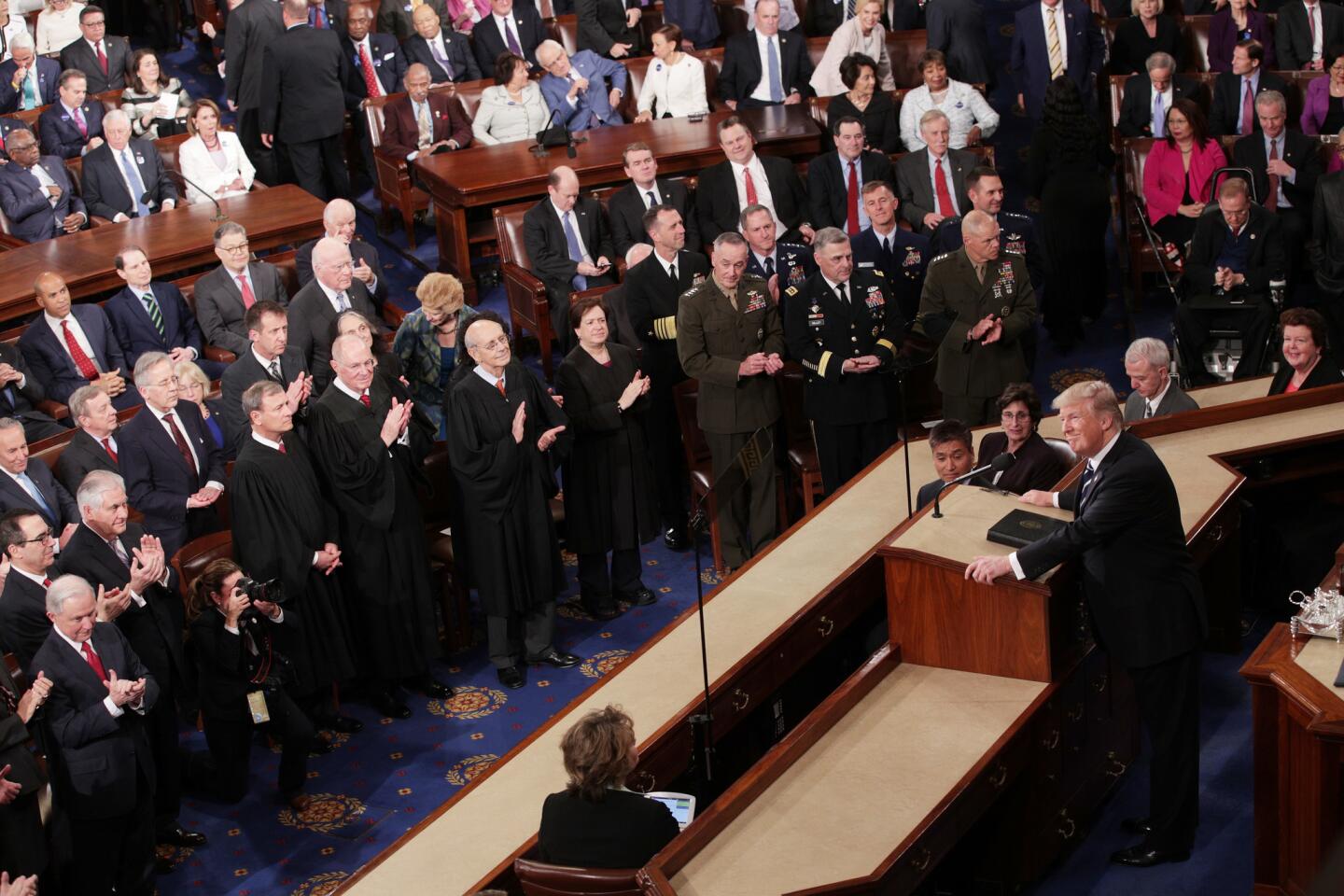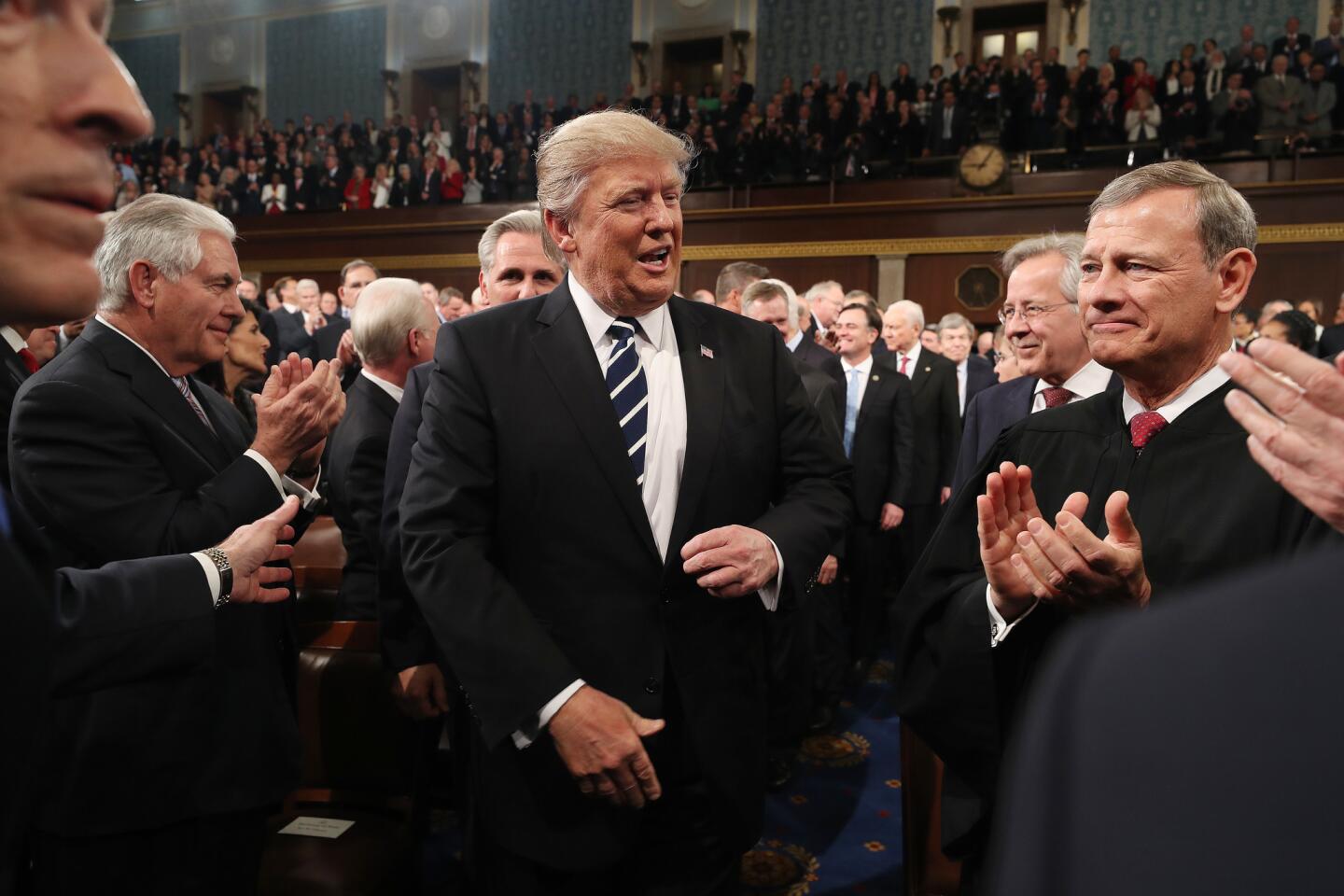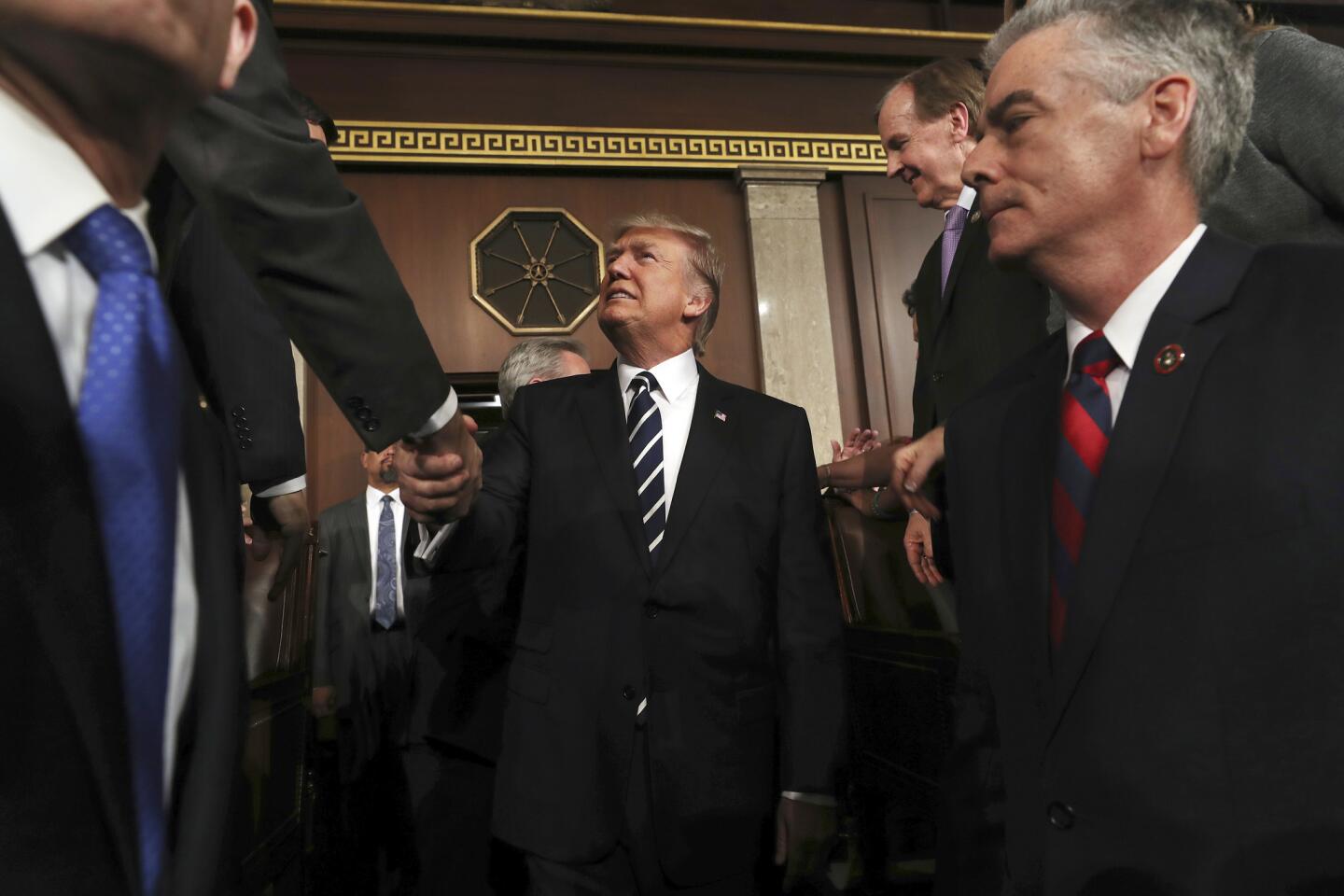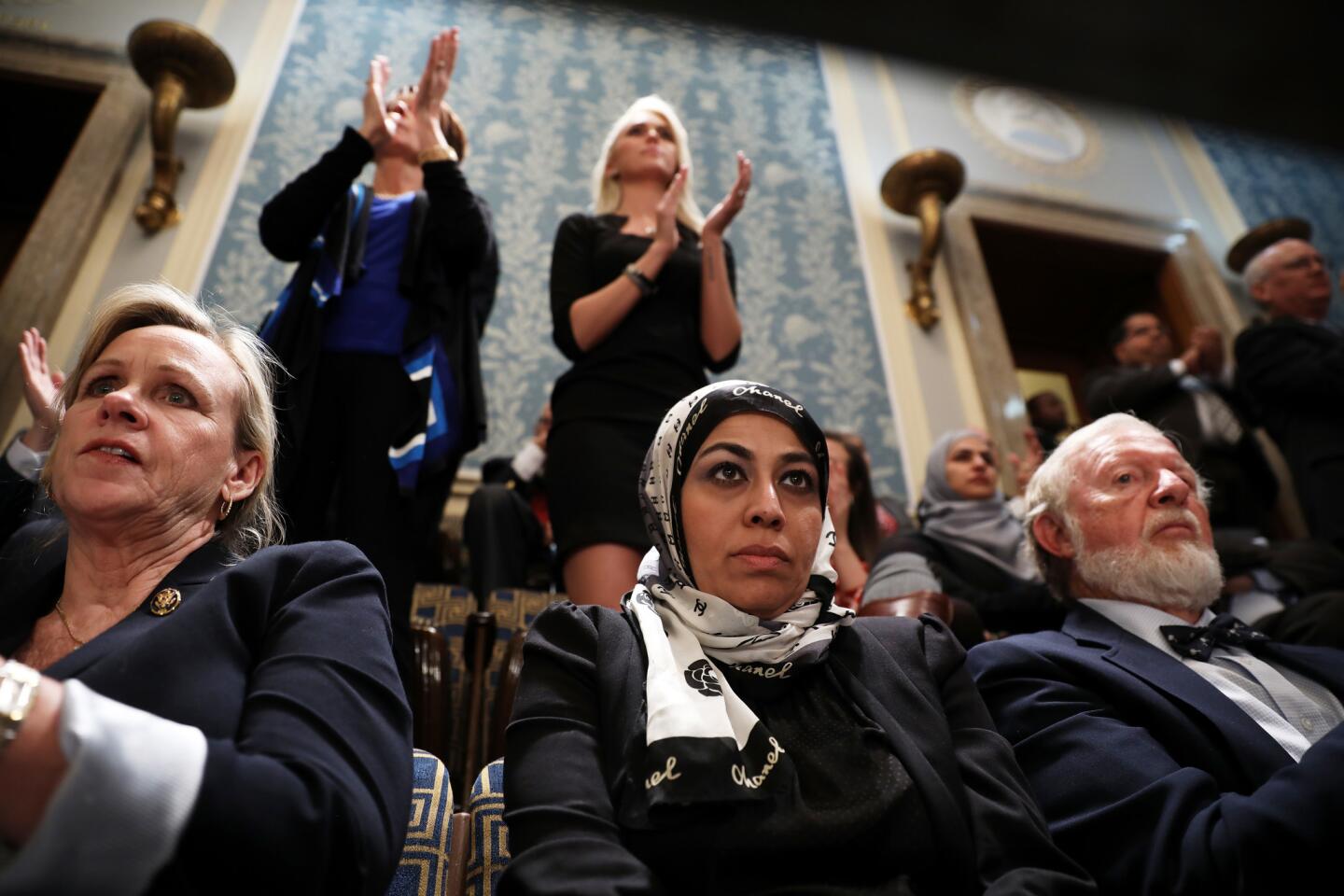Trump lays out ambitious plans for healthcare and immigration in a disciplined speech to Congress

President Trump outlines his agenda to Congress and touts “promises kept” in his first month in office.
Reporting from Washington — President Trump championed new approaches to healthcare and immigration Tuesday in a disciplined address to a joint session of Congress that may have been his most traditional political speech since he entered public life decades ago.
The outsider who has relished blunt and confrontational stage banter honed from talk radio delivered a speech that took aim at his long-promised goal: to be “more presidential than anybody.”
Trump softened some of the rougher edges of his nationalist ideology as a call for citizens to appeal to their better natures for a “renewal of the American spirit” and to leave “the trivial fights behind us.” He told the inspirational story of a child who survived a near-fatal disease and mourned with a widow who lost her husband to a botched military operation. And he sought to emphasize some of his proposals that may draw bipartisan support, such as lower-priced prescription drugs and paid family leave, prompting a rare ovation from Democrats in the room.
“Everything that is broken in our country can be fixed,” he said. “Every problem can be solved. And every hurting family can find healing, and hope.”
The new president used his first address to a joint session of Congress to cast his short tenure as a series of promises made and kept to working Americans, and then went on to make even more. He vowed to deliver reforms that would “raise wages, help the unemployed, save billions of dollars and make our communities safer for everyone.”
“When we fulfill this vision … we will look back on tonight as when this new chapter of American greatness began,” he said.
The speech, which replaces a State of the Union during a president’s first year in office, provided Trump with the most formal occasion since his inauguration to sell his agenda to a public that remains sharply divided over his presidency. Trump remains popular with supporters, but his approval rating is historically low for a new president.
A single speech cannot be expected to turn around Trump’s presidency, which has suffered from early missteps and internal disorganization. But it may allow him a new opportunity to debate policies that many in his party have been yearning to discuss, creating new space amid some of Trump’s self-inflicted distractions.
In addition to immigration and healthcare, Trump also renewed his call for investing $1 trillion in roads, bridges and airports, promised significant tax cuts and called on Congress to pass a school choice plan that includes a voucher program popular among conservatives but loathed by Democrats. Trump also requested billions of dollars in spending increases on the military and veterans’ health. He intensified his call to deregulate businesses, drawing sharp lines with liberals who say those regulations protect worker safety and the environment.
The speech was vague, putting few details beyond broad prescriptions to make things better. And it will be nearly impossible to accomplish them all while still holding to Trump’s pledge to avoid adding to the federal budget deficit.
His vow to rewrite health policy epitomized the challenges ahead in turning rhetoric into reality. Trump promised to replace Obamacare “with reforms that expand choice, increase access, lower costs, and at the same time, provide better healthcare.” The issue has vexed lawmakers from both parties who have struggled to provide both quality and access without driving up costs.
Trump’s demands included: ensuring coverage for those with preexisting conditions, tax credits and health savings accounts, more flexibility with Medicaid dollars for the states, changing laws to restrict malpractice lawsuits, and selling insurance across state lines.
Trump called his message one of “unity and strength,” after weeks in which he appeared preoccupied with relitigating battles from the campaign and antagonizing the media.
Aides said the text was informed by the union workers, coal miners and other working people Trump has met in his early days in the White House, a period that has also included numerous meetings with and high-level appointments of wealthy business executives.
For too long, Trump said, the middle class shrank as jobs moved overseas. Inner cities struggled and infrastructure crumbled as the nation’s leaders instead focused on defending “the borders of other nations” and “spent trillions of dollars overseas.”
His election, Trump said, was “an earthquake” resulting from the nation’s “quiet voices” rising up, and he promised to deliver on their behalf.
Trump challenged opponents who have bristled at his aggressive approach to tackling illegal immigration, including his “great, great” border wall. What, he asked, would they say to an American family that “loses their jobs, their income, or a loved one, because America refused to uphold its laws and defend its borders?”
He continued to portray open borders as a dire threat to safety and security, highlighting three Californians whose relatives were killed by people in the U.S. illegally.
But he also said he believed that “real and positive immigration reform is possible,” suggesting openness to a more modern immigration system that would allow more skilled workers to enter.”
“If we are guided by the well-being of American citizens, then I believe Republicans and Democrats can work together to achieve an outcome that has eluded our country for decades,” he said.
The current legal immigration system heavily emphasizes family unification and is aimed at allowing in people from around the world striving to take advantage of American opportunity. By contrast, Trump advocated a system that would emphasize immigrants who already have skills the U.S. economy needs. The shift could also reinforce the goal of Trump’s nationalist advisors to alter the country’s demographics.
Trump also failed to mention the so-called Dreamers, the young people temporarily shielded from deportation under an immigration program created by President Obama. Trump vowed during the campaign to end protections for them but has publicly wavered several times, and his administration continues to issue work permits to those who apply and qualify for the program.
Trump opened his address with his most expansive condemnation to date of acts of violence and vandalism motivated by religious and racial bigotry.
“We may be a nation divided on policies; we are a country that stands united in condemning hate and evil in all its forms,” he said, denouncing the spate of bomb threats to Jewish community centers and a shooting of two Indian men last week in Kansas.
The most powerful moment came when Trump acknowledged Carryn Owens, the widow of Navy Chief Special Warfare Operator William “Ryan” Owens, who was killed Jan. 29 during a raid on a compound in Yemen used by Al Qaeda’s affiliate there.
William Owens, the Navy SEAL’s father, called for an investigation into the raid this week. The military has acknowledged that Yemeni civilians, including women and children, were also killed, along with 14 militants.
Congress gave a standing ovation as Carryn Owens looked up, tears in her eyes, her hands folded. The applause lasted for more than a minute — the longest of the night.
Democrats said the speech’s upbeat tone did not match Trump’s true agenda, or his performance so far.
Former Kentucky Gov. Steve Beshear, chosen to deliver the party’s response, said Trump’s early actions showed he was “Wall Street’s champion,” before turning to defend Obama’s healthcare overhaul that he said had been a revelation to his conservative-leaning state.
“Mr. President, folks here in Kentucky expect you to keep your word. Because this isn’t a game – it’s life and death for people,” he said.
Staff writers W.J. Hennigan, David Lauter and Sarah D. Wire contributed to this report.
[email protected] | Twitter: @noahbierman
[email protected] | Twitter: @mikememoli
[email protected] | Twitter: @bybrianbennett
ALSO
Grade the president: Here’s how you think Trump is doing so far
Trump said he would isolate his family businesses, but they have already seeped into the White House
UPDATES:
9:15 p.m.: This story was updated with more details from Trump’s address.
8:30 p.m.: This story was updated with more comments from Trump and the Democratic response.
7:30 p.m.: This story was updated with more comments from Trump.
6:15 p.m.: This story was updated with the start of Trump’s speech and prepared excerpts.
This story was originally published at 3:35 p.m.
More to Read
Get the L.A. Times Politics newsletter
Deeply reported insights into legislation, politics and policy from Sacramento, Washington and beyond. In your inbox three times per week.
You may occasionally receive promotional content from the Los Angeles Times.
